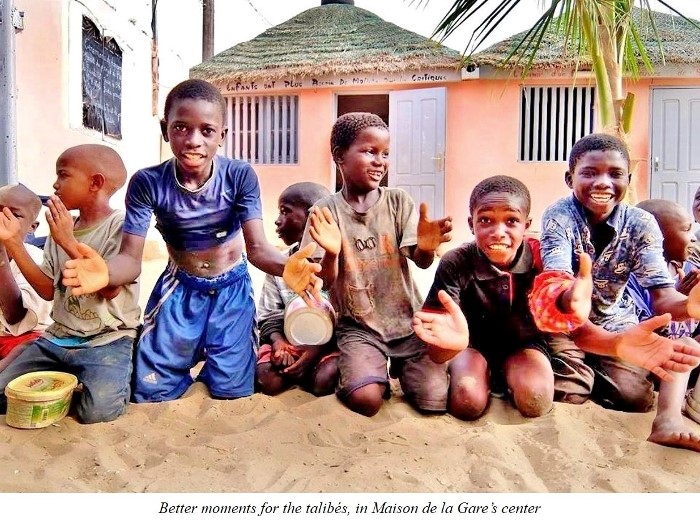News from Maison de la Gare
Slavery – A Modern Scourge (Part 2)
Tweeter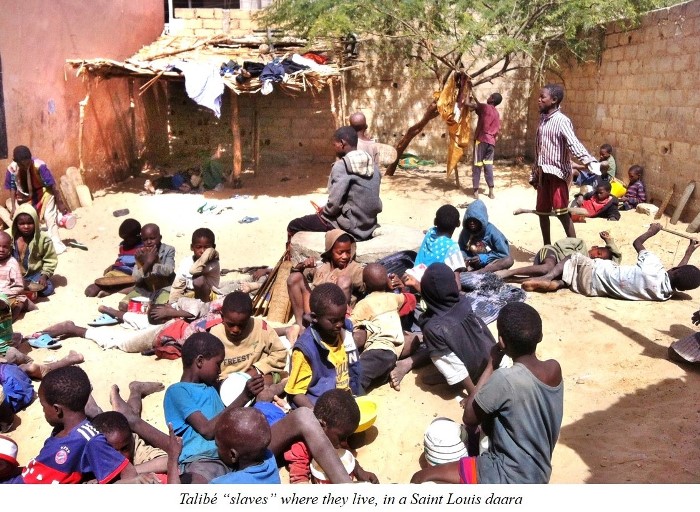
Three more cases of talibé children subjected to a brutal contemporary form of slavery
Almost every child who comes into Maison de la Gare’s center is a victim of a contemporary form of
slavery, whether they come to participate in our daytime programs or they have been rescued from the
streets by our night rounds team. Each child has a different story, but what they all have in
common is that they were separated from their families at a young age and forced to live in severely
abusive conditions for many years while having to beg or work for their
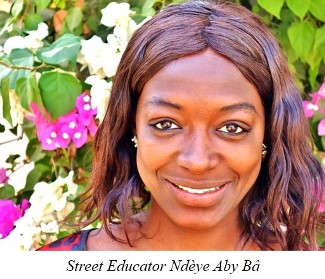 own food as well as for
money for the person controlling them.
own food as well as for
money for the person controlling them.
We recently shared elements of three of the 85 case
studies that we have prepared since 2012 for our
applications and reports to the United Nations Fund for the Struggle Against Contemporary Forms of
Slavery. We share three more of these case studies here, to further illustrate the situations of
these children and to introduce other members of our dedicated staff who struggle every day to give
them a chance in life. Once again, the boys' names and places of origin have been changed for their
protection, and we are not including any photos of them.
Abdoulaye (16 years old)
Our street educator, Ndeye Aby Bâ, reports that Abdoulaye was sent to a daara in Saint Louis at a young age
by his family in central Senegal. He was neglected in his daara, forced to beg for his food and for
money for his marabout. Now 16, Abdoulaye has not seen his family for many years. He has run away
from his daara several times over the years and was brutally beaten each time he returned.
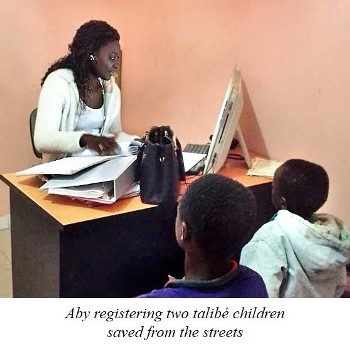
Abdoulaye’s marabout abandoned his daara at the beginning of the pandemic, and Abdoulaye ran away
once more. This time he lived alone on the streets for several months, suffering extreme deprivation
and hunger. Mamadou Gueye and the night rounds team found him sleeping alone, and Abdoulaye agreed
to accompany them to Maison de la Gare’s center. He stayed in our emergency shelter for several days,
recovering his health, eating nutritious meals, and having his injuries treated by our nurse
Awa Diallo in the infirmary.
Aby investigated Abdoulaye’s case, exploring possibilities with him. He refused to return to his
village, as he no longer has any links there and would likely just be sent back to his daara.
Abdoulaye agreed to register in our poultry farming apprenticeship program, to learn the skills he
needs to become self-supporting. While in this program, he is living with some other older talibés
in transition in an apartment provided by Maison de la Gare. He is at our center regularly to wash,
eat and receive hygiene and medical support. He also participates regularly
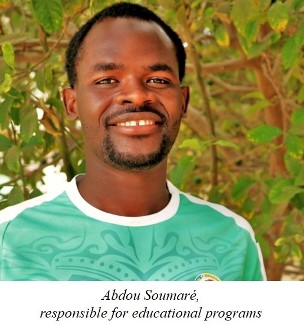 in the karate program,
which provides strong reinforcement of his growing sense of self-respect and empowerment.
in the karate program,
which provides strong reinforcement of his growing sense of self-respect and empowerment.
Moussa (10 years old)
Moussa was sent to a daara in Saint Louis from his home village in Guinea Bissau when he was only
6 years old. Although his family had understood that he would be learning the Quran, Moussa is
effectively a slave, forced to beg for his food and for a financial quota to pay to his marabout.
Living without access to potable water or hygiene facilities, he was filthy, in bare feet and
wearing rags when he first came to Maison de la Gare two years ago. He had discovered our center
by word of mouth from other talibé children.
Teacher Abdou Soumaré reports that, when Moussa first came to Maison de la Gare, he seemed small for his
age, malnourished and very timid. After his first few visits, he began to eat regularly, take
showers, and pass his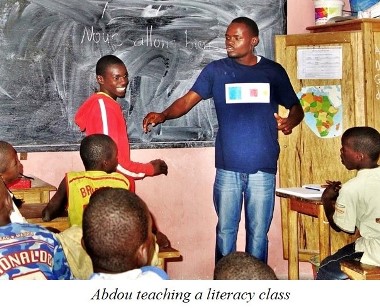 time participating in games and playing with the other children. Moussa
started to watch the morning karate classes in the center. He became interested but stayed shyly
on the sidelines. Finally, after a month, his curiosity got the better of him and he asked
Abduramane Buaró, the instructor, if he could join.
time participating in games and playing with the other children. Moussa
started to watch the morning karate classes in the center. He became interested but stayed shyly
on the sidelines. Finally, after a month, his curiosity got the better of him and he asked
Abduramane Buaró, the instructor, if he could join.
Once he started karate, Moussa never missed a class. He eats regularly at the center and has
gained strength and stature. He now comes every day to the center. He is full of confidence,
respectful and listens attentively, skills learned through karate. Moussa now has a sense of
self-respect, evidenced by his efforts to keep himself and his clothes as clean as possible.
He participated in his first karate tournament at the end of 2019, just before the pandemic struck.
Moussa is only 10 years old, so he could continue in his daara for another 10 years. We expect
that Maison de la Gare will be a big part of his life during this time. We are now
encouraging him to participate in French literacy classes, and he is very motivated to
advance in karate and to earn higher belts, as many of the older talibés have.
Alioune (13 years old)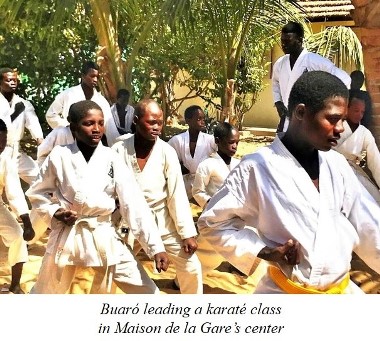
Aby Bâ reports that Alioune began coming regularly to Maison de la Gare’s
center in 2017. At the time, he had already been a talibé for almost five years, having been sent
to Saint Louis from his home in central Senegal when he was only five years old. His parents
had not been involved in his life since he was sent to Saint Louis, and he suffered enormously
from the harsh living conditions and from being forced to beg on the streets for many hours each
day for his food and for the quota of money for his marabout.
In Alioune’s case, his marabout was often away, and he had to give the proceeds of his begging
to the “grands talibés”, older boys in the daara acting on behalf of the marabout. As is often
the case, these grands talibés are the worst abusers, perhaps living out the abusive behavior
that they themselves had been subjected to, and perhaps feeling a sense of power in their lives
with little to look forward to.
Alioune’s marabout was away during the worst of the pandemic, leaving the grands talibés in charge.
They collected the daily quotas on behalf of the marabout and sent the money to him, but otherwise
left the young talibés to fend for themselves, without food or any sort of care or supervision.
They beat Alioune brutally when he failed to submit his quota.
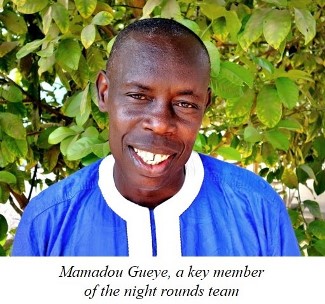
In September of 2020, Mamadou Gueye and the Maison de la Gare night rounds team found Alioune sleeping
alone on the street. Since he knew Maison de la Gare well, he agreed to come with the team to the
emergency shelter. He stayed in the shelter until his marabout was able to come to answer questions
about the beatings that he had received. The marabout assured Aby that he had not beaten Alioune
himself and that he had now returned to the daara and would ensure that the beatings would stop.
However, later the next month the marabout was again away, and Alioune ran away after another brutal
beating. The night rounds team found him again. This time, the street educators took Alioune home
to his village and found his family. They agreed to register him at a local daara so that he can
live at home with them. As soon as it is safe again after the pandemic, our street educators will
make a follow-up visit to the village to ensure that Alioune is safe and that his new daara
is well supervised.
________
With gratitude to the United Nations Fund for the Struggle Against Contemporary Forms of
Slavery, and to all our precious donors. You make possible our work to bend the lives of
these innocent children towards hope and justice.
